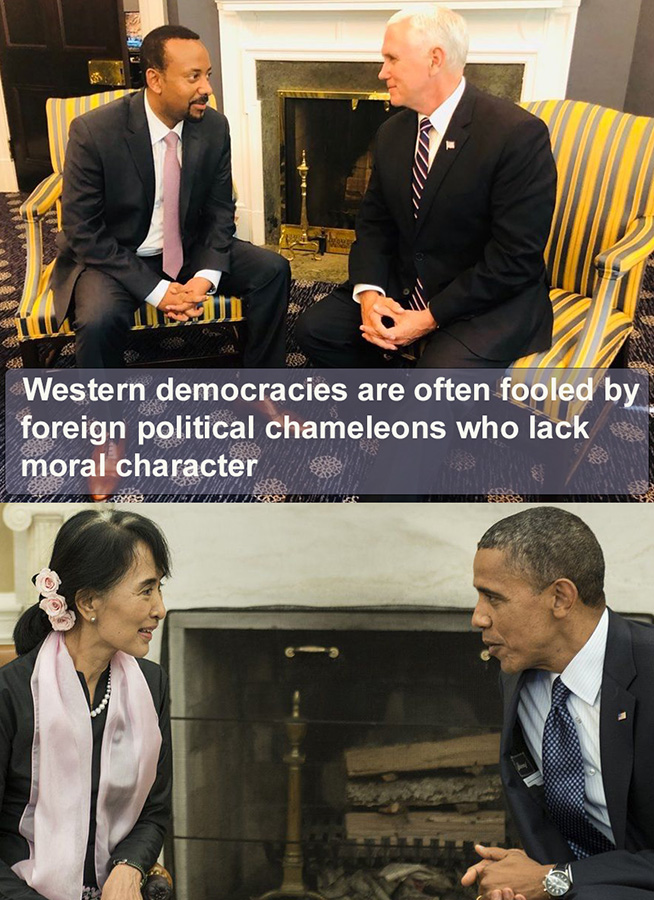
Is Ethiopian Prime Minister Abiy Ahmed taking a cue from previous Nobel Peace Prize winner, Ang San Suu Kyi, who herself became immersed in controversy when she appeared to have compromised with military generals in Myanmar rather then stand up against the oppression of the Rohingya? The history of Abiy Ahmed since he took power in 2018 has been one of statements and actions which can turn 180 degrees from the previous one. Domestic and international stakeholders holding on to fantastical confidence that somehow under Abiy Ahmed Ethiopia will find peace and prosperity is doing the opposite. The gift of charisma does not guarantee devotion to democratic values or good leadership.
The once heralded leader has seen his image degenerate to what can be best described as another self-centered African despot willing to sacrifice both the blood and treasure of Ethiopia to retain power. The standard of living for the average Ethiopian is plummeting with state security and economy in a nose dive. At this moment he is ordering military action against the Amhara militia group, FANO, who was key to securing the Prime Minister’s influence in Ethiopia. The Eritrean Ethiopian alliance is crumbling because Ahmed no longer sees it as key to his political survival.
Even though he was once elected to Parliament as a representative of the Oromo people and often championed the rights of Oromos to housing near Addis Ababa most of his actions have been seen to be favoring Amhara over Oromo interests since 2018.
Now however as he comes under heavy scrutiny of international leaders in the Western democracies with many being unabashedly critical of his actions. Yet even in criticism they are reluctant to give up on his leadership. He seems to creating a new strawman on whom to blame his woes. Whereas before he claimed the Tigray were the bogeyman causing all Ethiopia’s lack of potential achievement that has been replaced his previous allies, the Amhara expansionists.
This reversal of amity to enemy happened with the Oromo leader, Jawar Mohammed, whose followers, the Querroo, were primarily responsible for deposing the previous regime making way for Abiy Ahmed to come to power. Abiy Ahmed had Mohammed accompany him for his USA tour but jettisoned him later in favor of the Amhara expansionist whom he thought offered him substantially more political security.
No doubt he knows a reckoning is happening within the international community that a blow to the potential for Ethiopian democracy has happened under his tenure. One can easily imagine that he is creating scape goats of the Eritrean and Amhara leadership now. Likely he is telling the international community that these influences whom he trusted to act righteously in the “law enforcement operation” turned it into a wrongful act against the people of Tigray. This he will claim was not his intent.
What allows this possibility is the fact that even in the face of incontrovertible evidence of cruelty and genocide many Western leaders cannot accept two realities. One is the nefarious conception there is still potential benefit in having Abiy Ahmed as leader. Naively they must feel by that his inexperience or trust of his deceptive advisors accounted for the evil that has happened in Ethiopia. The other falsehood is reminiscent of the Yugoslavia experience where the global community thought for sometime that preserving the state against division was more important then protecting human rights. This cost the former Yugoslavia years of death and destruction. Similarly I fear the same is true for Ethiopia until Ethiopians, Africans, and the world at large wake up to the reality that it is time for change in leadership. These false assumptions are costing Ethiopia its future.

